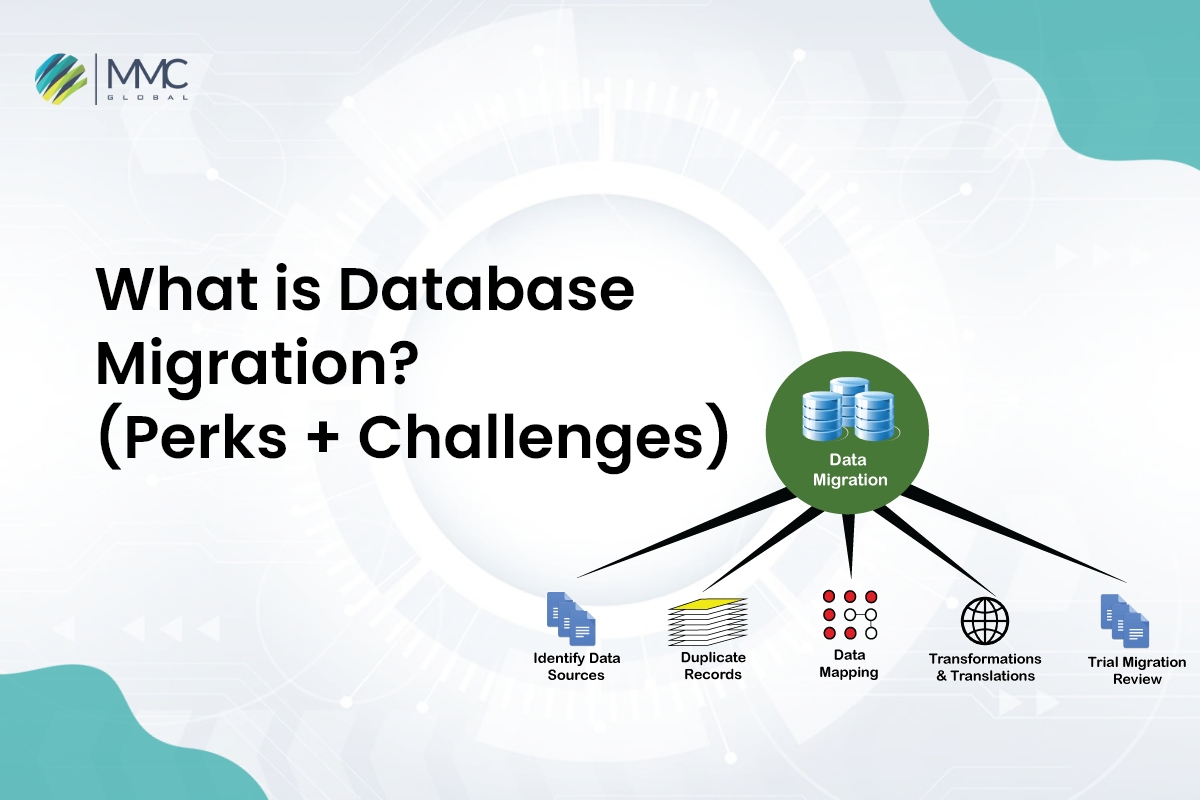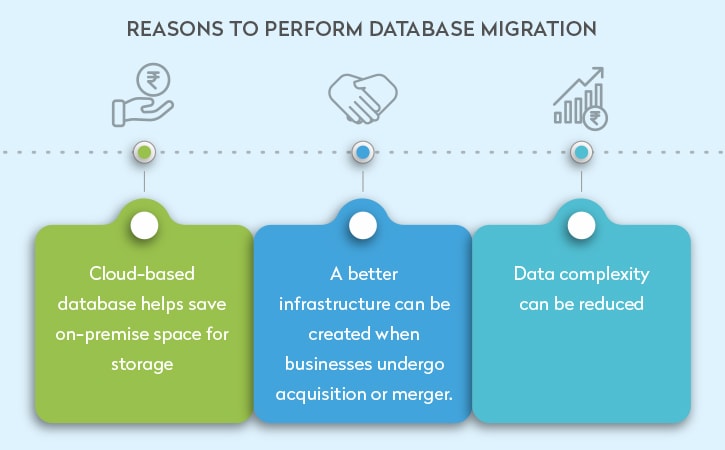What is Database Migration & Why Do You Need Data Migration Services?


Data is a precious asset and the pillar of growth for any organization. If I am not wrong, the future technology and market are based on databases. That’s why organizations prevent data by maximizing its security or adding a solid database system. Once they find it, the need for application and database migration is essential.
So, database migration is a hot topic to discuss when securing your database. Companies using different tools to migrate data need initial know-how to handle it. If you are not proficient in it, don’t dare to do it yourself.
You can hire a database migration service company like MMC GBL to cope with complex situations. Otherwise, it has a huge chance of losing a database you do not want. Similarly, if you hire an unprofessional database migration company, it will also be a risk factor.
Let me tell you that at MMCGBL, your valuable data and application are safe in our hands. We encourage our clients to meet and talk with our team to discuss the problem and requirements. So, our team will provide the best alternatives for your application and database migration services.
So, before interacting with us, let’s discuss what data migration is and why you need it to survive in this market.
What is Data Migration?
Data Migration is the transmission of data from one storage or place to another, just to improve the overall storage system. Generally, it happens when we get the safest and improved location to store data.

Moreover, businesses mainly try to eliminate the legacy data management system by moving application migration. As a result, they enjoy new efficient and secure apps with a similar database. Data migrations are frequently initiated these days as businesses transition from on-premises infrastructure and applications to cloud-based storage and apps to improve or change their business.
What Are the Types of Database Migration?
Database migration fuels the productivity, performance, and security of the application. Providing an exceptional database ultimately benefits your business by keeping your data safe and more accessible. However, there are three types of data migration. What you need is what your choice is.
Storage Database Migration
Other systems can access migrating data from outdated databases to newer ones. Provides substantially quicker performance and more cost-effective scalability while supporting standard data management capabilities like cloning, snapshots, backup, and disaster recovery.
Cloud Database Migration
Moving data, applications, or other business operational elements from an in-house data center to a cloud or from one cloud to another. It frequently implies a storage migration as well.
Cloud-based deployment of data migration is expected to grow at a CAGR of 20.45% during 2020-2025. –
Application Migration
In application migration, the whole application and its data move from an on-premises data center to the cloud or between the clouds. This process opts for legacy application modernization or a complete transformation to the new environment.
Get more info: A Complete Guide On Legacy App Modernization
To stay ahead of the curve in today’s highly competitive and fast-paced world, businesses must swiftly adapt to developing technology. Here are a few of the reasons why database migration is so critical in today’s organizations:
Perks of Database Migration
Here are the exact reasons for database migration you should know.
Cost-Effective Approach
Continuing to employ an out-of-date database may cost organizations a lot of money in terms of expenses. Businesses that use an old system may need to install additional applications and systems to allow faster typical procedures. When confronted with insufficient infrastructure, firms can also be challenged to grow. The expense and time of administering an out-of-date database can result in lost money, production, and prospects over time.
Transmitting a corporate database to a platform that would better serve its function and be more efficient can provide several benefits. Businesses may save money on infrastructure and the knowledge and people necessary for continuous upkeep. Professional database migration services are adaptable and increase system security, dependability, speed, and disaster recovery planning. Database migration can also reduce the likelihood of costly service disruptions.
Enhance Productivity
As a company expands and becomes more effective, its services and apps often see a rise in daily traffic. However, some businesses may find it challenging to grow their resources to satisfy this rising demand.
Application migration to the cloud is one method to alleviate these issues. Database migration services can assist enterprises in achieving speedy application deployment and installation. When cloud services are used, servers with resources may be placed on-demand, allowing businesses to adjust without investing in costly infrastructure swiftly.
Modernized Technology
Adopting modern technology is the best idea for moving your business in the right direction. Professional database migration helps to enjoy a competitive market advantage. Moreover, companies encourage eliminating legacy data systems to the upgraded and current database needs.
Avoid Duplicate Data
One of the critical goals of database migration is to consolidate all company data into a single, centralized hub. This change can assist in reducing the existence of duplicate data created by many platforms storing data from various departments within a corporation. Data may become accessible by all firm divisions when kept in a single location following database migration.

Data Redundancy can occur for a variety of causes, including human mistakes. It is also frequent during a merger or acquisition when systems are integrated. When multiple systems are isolated within an organization, duplicate data may develop in some circumstances. When departments in a company have distinct databases that are not in sync, it can be difficult to obtain insights from these inconsistent databases.
Security and Backups
It is usual for organizations to disregard the requirement for frequent backups when storing data on PCs or servers. In the case of a system failure or data breach, this puts the firm at risk of catastrophic data loss. The movement of data to the cloud encourages good backup and recovery practices.
Many cloud providers provide reliable data backup solutions and data management services to help organizations back up their data regularly with no effort. Data that is routinely backed up is less vulnerable to lose.
Time Saver and Quick Maintenance
Many businesses struggle with complicated infrastructure, wasting time and money. Cloud services introduced many manual tasks that reduced the time in half. Take the example of monitoring potential application failures and predicting unexpected disruptions in virtual machine operations.
Businesses may avoid having a dedicated IT crew overseeing the infrastructure around the clock as organizations handle it independently. Cloud services include periodic maintenance, system updates, and other administrative operations that might squander time to focus on essential tasks that will help the organization expand.
Promote Collaboration
While working on the same project with hundreds of employees, the need for a shared platform is a must. The cloud supports team collaboration by providing collaborative and sharable platforms to access data and make changes.
Cloud computing also helps to run application databases by login from anywhere. Whether on leaves or working from home, you can access all the platforms without any hassle, no matter where you are. Additionally, it is easy to use a shared document to access everyone.
Steps For Database Migration Process
Database migration is a complex process. Because data migration entails more than simply moving material from one location to another, it needs the skills of globally recognized professional specialists. The following are the steps in the procedure:
- Creating methods to help you achieve your goals.
- Overall evaluation and analysis of the material.
- Preparation.
- Content classification, extraction, and categorization
- Content validation, staging, and quality assurance.
- Exportation
- Decommissioning and disposal of obsolete systems.
Database migration automates data synchronization while causing the slightest disturbance and upheaval. It assists businesses in meeting recovery point targets while assuring smooth and efficient operations.
Challenges Facing While Data Migration
Accessibility of governance: Improve the editorial access of your data. Restrict those who can edit, view, or remove the data.
Lack of expertise: It’s not a child’s play to migrate the data from one station to another. It may look like a simple task, but this includes extreme complexities. Only professionals and experts handle it.
Lack of planning time: It’s a time-taken process that’s why it needs time to plan the migration. The skipping planning step is not an option for a smooth migration.
Communication Lackness: Regardless of the magnitude of the migration, the data transmission is the concern of all. Discuss your plan with stakeholders before they get wrong and other related people so they can guide you better.
Hire Professional company: Research, research, and research. Choose the trusted company that can handle your data management. Data migration is all about the pro task that can support and manage problems.
Bottom Line
Last but not least, data migration is a vast topic to cover. But for this time, let’s wrap up here. Data migration may increase an organization’s competitiveness and overall performance. Data migration for a variety of reasons, including better handling of traffic surges, improving inefficient operations, meeting data storage needs, promoting disaster recovery, and lowering server operating and maintenance expenses. If you need to consult about application and data migration, Let’s meet. We will help you all along the way.



